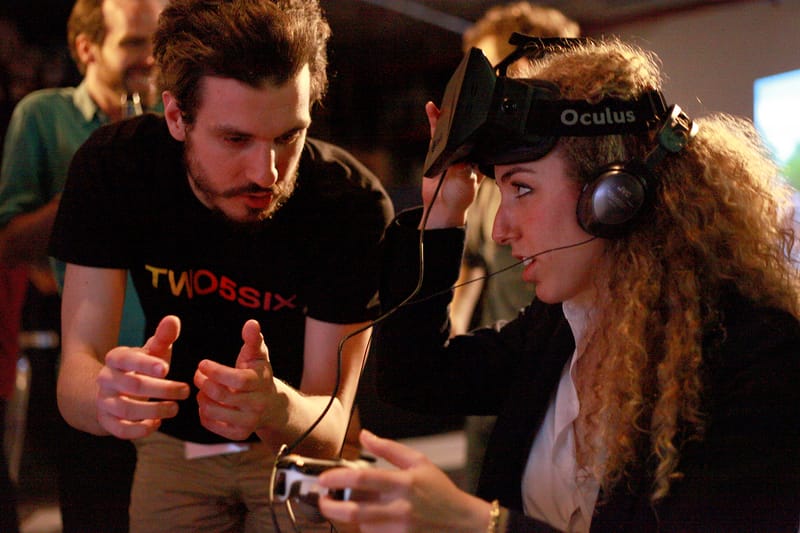The last sentence of Richard Matheson’s I Am Legend is where I wish more post-apocalyptic videogames began. Robert Neville, the last human left in Los Angeles, spends much of the story studying a vampiric plague that wiped out the world. Unlike the disastrous movie, he does not manage to find a cure. Instead he learns that the infected survivors have formed a new society, and he is their boogeyman. On the final page Neville utters the book’s title because he understands that brutally killing the vampires while they slept during the day made him no different than the villain of Dracula. In that final line, “I am legend” shows the reader how individuals lose identity and get swallowed up by the monster myths of civilization.
This interpretation of Matheson is not far from game critic Ian Bogost’s recent claim in The Atlantic that videogames represent complex systems. Instead of presenting plot arcs, Bogost argues that games should present “machinery that shows us something about the world outside ourselves, something incomplete and grotesque even, but something we ought to see.” Not surprisingly, Matheson’s story demonstrates that literature has a much longer history of representing social machinery. As a genre, the post-apocalyptic story allows authors to explore what it means to be human in the wake of some cataclysm—be it bomb, plague, or climate. The tradition continues to this day in videogames, which feature miles of derelict cities and radioactive countrysides. However, game designers often shy away from depicting cultural machinery and instead fill their games with the rote tasks of survival. Popular series such as Left 4 Dead and Fallout care more about the run-and-gun combat of molotovs and Mad Max-style DIY armor than social critique found in the works of Richard Matheson or George A. Romero. The drudgery of acquiring food, fuel, and munitions that plagued Neville for a majority of his book seem to be the only experience that game designers deem interesting in life after The End.
designers have trouble separating Armageddon from the chore of scavenging for shotgun shells.
Tatyana Tolstaya’s 2003 novel, Slynx, upends these entrenched beliefs about the end of the world in a blend of narrative and game-like social commentary about class struggle. The book takes place in the feudal countryside of Russia ruled by Fyodor Kuzmich many years after “the Blast.” Benedikt, the protagonist, is a young bureaucrat who copies books from the government archives and switches out the original author for Fyodor Kuzmich. In time, he meets the “Oldeners,” ancient survivors from the pre-Blast era, who wish to restore Russian literature to its former glory. But necessity, nonetheless, compels him to ignore the rebels and marry into the ruling upper-class. As a perk of the marriage, his father-in-law tasks Benedikt with the job of raiding the homes of his once-fellow villagers and confiscating any books they have. From just this plot summary alone you can see that Tolstaya makes great leaps away from the zombie-killing mayhem that gluts our collective imagination of the post-apocalyptic wasteland. The economy she develops between mice and books is profoundly interesting when compared to the medium of videogames, where game designers have trouble separating Armageddon from the chore of scavenging for shotgun shells.
In Tolstaya’s post-apocalypse, people can actually take their time and walk somewhere without risking certain death. In the first sentence, as Benedikt readies to leave the house he puts on his boots, checks the stove, and finally brushes crumbs from the counter to the floor, “for the mice.” This one, insignificant action signals that Benedikt’s world is different from our own, where, presumably, we avoid having vermin in our kitchens. We can easily imagine a player controlling her videogame avatar to sweep a counter and thereby feed a growing mouse population. The ritual action feels refreshingly domestic in a genre where frenetic combat is the routine. More importantly, Tolstaya’s simple first sentence sets the stage that this is not some wild, other-worldly adventure story; these people are very much like us, small and habitual, just trying to eke out a living during tumultuous times.
As Slynx continues to unfold, we learn that mice are a fundamental unit of economic exchange for the peasant class. Spreading crumbs ensures that peasants have a constant income of rodent currency:
they depend on mice. They can’t do anything without mice. They need them for soup, of course, and stew, and if you want to sew yourself a coat, or trade at the market, pay taxes, that is, pay the tithe. There’s the house tax, the pillow tax, the stove tax—you need mice for all of them
A mouse economy is exciting because it rejects the zero-sum gains of scavenging. Mice are a source of capital that continue to renew themselves with just a modest investment of stale bread. And, like other livestock, they permit sedentary societies. This is the core difference between the protagonist of Slynx and almost all other post-apocalyptic texts: Benedikt does not have to be a nomad. He can be domestic, educate himself, and make culture instead of wage war.

Slynx deserves analogy to game systems because Tolstaya shows us that all of Benedikt’s decisions have a domino-effect rooted in his society. In this light, mouse-farming is more than another iteration of Farmville because, later in the book, Benedikt learns that mouse production actually keeps the village community oppressed by the upper class. His father-in-law reveals to him that books, not mice, are the real measure of success, and that as long as the villagers depend on mice they will remain subservient to Fyodor Kuzmich’s monopoly on knowledge. Tolstaya reveals these two antagonizing systems to her protagonist in the same manner that a player might naturally discover the rules of a videogame through cause-and-effect observations.
One immediately noticeable contrast is that, unlike mice, books cannot reproduce. They are a limited, permanently dwindling resource for a society without the printing press—and with scarcity comes conflict. Benedikt’s in-laws try to justify their hoard of books by insisting that the peasants are inherently inferior:
Because society is backward, the people live in the darkness of ignorance, they’re superstitious, they keep books under the bed, or even bury them in damp holes. You can destroy a book this way. It rots, falls apart, gets covered in green mildew, gets worm holes. Books have to be protected, they belong in a dry, bright place, they have to be cherished and cradled, preserved and kissed. No one else will bother, there’s no one else to take care of them
According to this excerpt, peasants cannot be trusted with delicate books. This “us versus them” mentality provides Benedict with clear gameplay guidelines for optimizing book preservation. Instead of GTA we have Grand Theft Novel, featuring Benedikt kicking down doors to confiscate textbooks and paperbacks. The irony is that these books are useless when never read. Sterile libraries are at odds with the mouse-breeding environments and underscore the key problem of the novel: should these characters be trying to memorialize the past or create a new future?
Slynx unifies player choice and social commentary far better than most virtual games
On one hand, the mouse marketplace encourages shared economic benefits among the villagers because anyone can raise mice. In contrast, the book economy is divisive; it assumes a hierarchy between those who are worthy to handle books and those who cannot be trusted with relics. The ideology that “no one else” will care makes Benedikt feel superior to the peasants who were once his peers. Note that the setting has not changed, only the character’s perception of the setting. In this instance, Benedikt’s new position forces him to change perspective on—to use Bogost’s language—the “machinery” of society. He now understands that seizing books helps keep the oligarchs whereas before he would never make the connection between book confiscation and mouse breeding. All this can be taught through observation without resorting to a lengthy tutorial or game manual.
Tolstaya’s world-building reads like an intuitive smartphone app. Even when her writing gets zany or her characters get Slavic and existential there is always a promise of clear direction to the system of choices and interactions. Benedikt can be viewed as a model player thrown into a new world of interlocking rules. As he matures through the novel he supports Bogost’s claim that simulators provide an appreciation for “the weird mechanisms that turn [the world’s] gears when we’re not looking.” To this end, Slynx unifies player choice and social commentary far better than most virtual games. At the climax of the story, Benedikt realizes how the ideology of the oligarchs keeps the book readers in power over the mouse breeders:
And why is it that spiritual life is called a higher life? It’s because you put books up as high as you can, on the top floor, on a shelf, so that if misfortune strikes and the vermin get into the house, the treasure will be safer. That’s why!

Mice eat books. This makes the two systems incompatible with one another and generates an inherent problem within the novel’s “machinery.” Tolstaya plays with a literal definition of “higher life” to show how language can mask the power struggle between oligarchs and peasants. In fact, no other character in the book is quite able to comprehend the feudal society quite like Benedikt because no one else sees their collective situation from multiple perspectives. As Benedikt achieves upward mobility and marries into a book-owning family he learns first and foremost the sacrifices are necessary to make that transition. The mechanical elegance could be summarized with a the single motion-controlled swipe of a Wii-mote: he’s no longer sweeping crumbs downward, he’s placing books upward.
Making sacrifices is an essential dilemma of the post-apocalypse genre. Slynx stands alongside The Walking Dead and The Road as stories that make us ask: “what are we willing to lose?” But videogame players don’t like to lose. The very question seems anathematic to the tenets of progress and empowerment. Games might learn to challenge these assumptions and realize it is no longer enough to ask players to survive or to hold them to binary morality choices. From Tolstaya’s view, decisions are not about metagame karma points but about the kind of world we want to live in. The mouse-eats-book mechanic reminds readers that people who rise to power are naturally going to make decisions that reinforce their power in subtle and convincing ways. This is not to say Slynx lacks violence; it simply has the conceptual ambition to obscure brutality behind the all-too-real idea that commodities (books) are more valuable than people.
books rely on rules just as much as games
These observations are not limited to Slynx or even just science fiction stories. All great novelists demonstrate a mastery of world building and game design. Plots and character choice always depend on the pre-figured rules and axioms baked into the setting: What would Pride and Prejudice be without Austen’s system of etiquette and courtship? Would Gatsby’s parties matter if Prohibition wasn’t law? What is Catch-22 without, well, Catch-22? These examples are not meant to be facetious but to remind us that books rely on rules just as much as games. From the moment someone made up an explanation for why lightning strikes or what happens when we die, they were weaving rules into narrative. Just because they do not appear to be interactive does not make them any less engaging. Otherwise, why are we all watching Let’s Plays?





